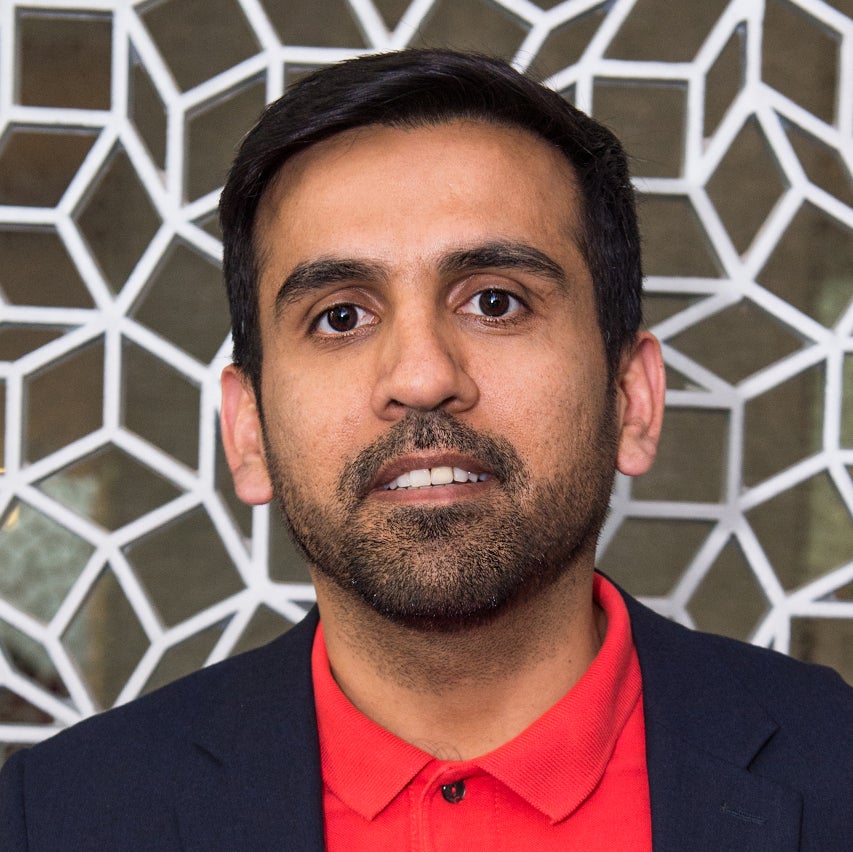
Dr. Omar Muhammad Khan
Assistant Professor
Dr. Omar Muhammad Khan
Assistant Professor
Educational Qualifications
PhD in Molecular medicine
MSc in Molecular Cell Biology
Entity
College of Health and Life Sciences
Biography
Omar Muhammad Khan is an Assistant Professor at the College of Health and Life Sciences at Hamad Bin Khalifa University. Dr. Khan completed his Master's in Biochemistry from Karachi University, Pakistan before moving to Sweden where he did a Masters in Molecular Cell Biology from Uppsala University, and then a PhD in the lab of Prof. Martin Bergo, a protein lipidation expert. In Bergo's lab, he identified the biochemical importance of the protein lipidation enzyme GGTase-I in immune cell function. He refuted the popular idea that GGTase-I can be a therapeutic target against inflammatory conditions.
After finishing his PhD, he moved to The Francis Crick Institute (London) in Dr. Axel Behrens's Lab, where he worked on identifying the posttranslational regulators of a tumor suppressor protein FBW7 and mechanisms of chemotherapy resistance in cancer. Dr Khan’s postdoc work highlighted the importance of protein ubiquitylation and protein turnover in colorectal cancer. He found that FBW7 which is a tumor suppressor, is posttranslationally downregulated in several colorectal cancers. These findings challenge the popular belief that only somatic loss of function mutations can contribute to cancer development.
PhD in Molecular medicine
Gothenburg University, Sweden
2007 – 2012
MSc in Molecular Cell Biology
Uppsala University, Sweden
2005 – 2006
MSc in Biochemistry
University of Karachi, Pakistan
2002 – 2003
- Role of protein ubiquitylation/deubiquitylation in colorectal & breast cancer
- Control of essential cellular pathways including TGFβ & mTOR signaling by E3 ubiquitin ligases
- Use of proteomics-based approaches to identify novel drug targets of therapeutic relevance
- Use of 3D intestinal organoids & Apc-/- colorectal cancer models to study the underlying mechanism of cancer development and progression
Assistant Professor
College of Health and Life Sciences, Hamad Bin Khalifa University
2019 - Present
Cancer Research Senior Postdoc Fellow
The Francis Crick Institute, Cancer Research, United Kingdom
2017 - 2018
Postdoctoral Scientist
The Francis Crick Institute, Cancer Research, United Kingdom
2015 - 2017
EMBO Postdoctoral Scientist
London Research Institute, Cancer Research, United Kingdom
2013 - 2015
Keyan, K. S., Salim, S., Gowda, S., Abdelrahman, D., Amir, S. S., Vargas, C., Teresa, M. B., Alwa, A., Dahal, S., Islam, Z. U., Kolatkar, P., Das, S., Torrisani, J., Ericsson, J., Farhan, M., & Khan, O. (2023). Control of TGFβ signaling by ubiquitination independent function of E3 ubiquitin ligase TRIP12. Cell Death & Disease.
Kohil, A., Amir, S. S., Behrens, A., & Khan, O. M. (2023). A small Rho GTPase RAB25 with a potential role in chemotherapy resistance in pancreatic cancer. Cancer Biomarkers.
Keyan, K., Alanany, R., Kohil, A., & Khan, O. (2023). E3 ubiquitin ligase TRIP12 controls exit from mitosis via positive regulation of MCL-1 in response to Taxol. Cancers.
Khan, O. M., Almagro, J., Nelson, J. K., Horswell, S., Encheva, V., Keyan, K. S., Clurman, B. E., Snijders, A. P., & Behrens, A. (2021). Proteasomal degradation of the tumor suppressor E3 ubiquitin ligase FBW7 requires lysine 11-linked branched ubiquitylation by TRIP12. Nature Communications.
Brisslert, M., Brakebusch, C., Wang, D., Bokarewa, M., Sayin, V. I., & Bergo, M. O. (2019). Protein prenylation restrains innate immunity by inhibiting Rac1 effector interactions. Nature Communications.
- March 2021– till filing, Qatar National Research Fund (Lead PI: NPRP13S, $400,000 for 4 years)
- June 2021– 2022, Qatar National Research Fund (Research mentor: HSRP03, $5000 USD for 12-months).
- January 2021– 2023, HBKU thematic grant in Precision Medicine (co-PI $200,000 for 2 years)
- July 2014–June 2017, VetenskapsRådet (VR) international postdoctoral fellow in molecular biology from Gothenburg University, Sweden. (Avtals ID: D0035901, 3.1 million SEK for 3-years)
- July 2013–June 2014, European Molecular Biology Organization’s (EMBO) postdoctoral fellow. (ID: ALTF 459-2013, GBP 28738 for 24-months)


